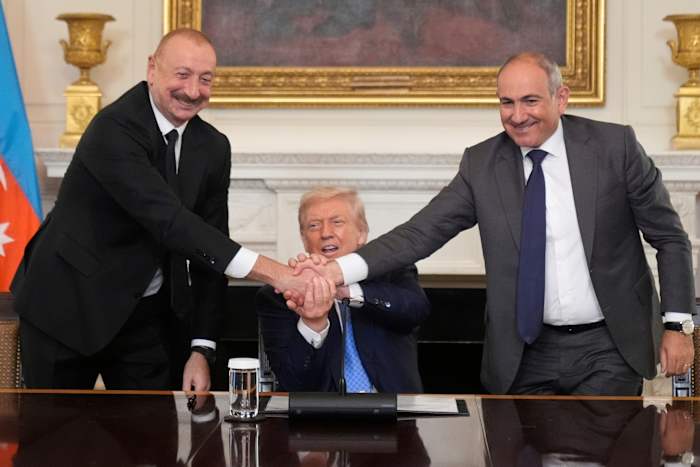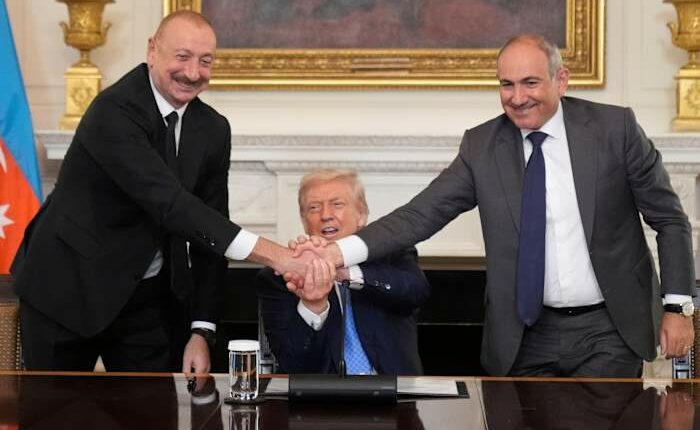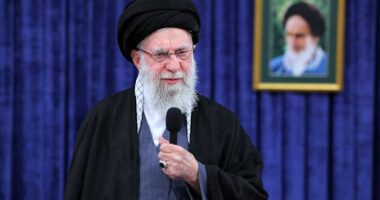Share this @internewscast.com

YEREVAN – Armenians and Azerbaijanis, including political figures and ordinary citizens, have reacted with a mix of cautious optimism and skepticism following a new U.S.-mediated pact signed by their nations’ leaders at the White House. The agreement aims to address their prolonged conflict.
The leaders, Azerbaijani President Ilham Aliyev and Armenian Prime Minister Nikol Pashinyan, signed the accord on Friday. They were flanked by U.S. President Donald Trump, who encouraged unity by shaking hands with both leaders as they did the same with each other.
This agreement is not a comprehensive peace treaty but marks a crucial diplomatic effort to improve bilateral relations. Armenia and Azerbaijan remain technically at conflict, with unresolved tensions over Nagorno-Karabakh.
The pact, however, signals changing regional power structures following Azerbaijan’s military success in 2023, which resulted in the retreat of Armenian forces and local ethnic Armenians from the contested area.
A key element of the agreement is the initiation of a new transit passage called the “Trump Route for International Peace and Prosperity,” signifying a shift in the geopolitical scene as Russia’s influence wanes in the South Caucasus region.
The dispute over Nagorno-Karabakh traces back to the Soviet Union’s dissolution. The area, although acknowledged globally as part of Azerbaijan, had been under the control of ethnic Armenian forces supported by Armenia for many years. Wars in the 1990s and again in 2020 caused extensive casualties and mass displacement. Azerbaijan recaptured most of the region through a rapid military operation in 2023.
Hopeful for peace and a weaker Moscow
Ali Karimli, head of the opposition People’s Front of Azerbaijan Party, wrote on Facebook that the signing of the agreement “has undoubtedly brought Azerbaijan and Armenia significantly closer to peace,” and noted that it delivered “another blow … to Russia’s influence in the South Caucasus,” while deepening ties with the U.S.
Arif Hajili, chairman of Azerbaijani opposition party Musavat, said he believed that “the most positive aspect of the initialing in Washington was the absence of Russia from the process.”
He said lasting stability in the region hinges on the continual dwindling of Russian power, which “depends on the outcome of the Russian‑Ukrainian war.”
Hajili also warned of lingering challenges, including Armenia’s economic dependence on Russia and some 2 million Azerbaijanis living in Russia.
“Russia will continue to use these factors as levers of pressure,” he said.
Hope on the streets of Azerbaijan’s capital
“We have been waiting for a long time for this agreement to be signed,” a resident of Baku, Gunduz Aliyev, told The Associated Press. “We did not trust our neighbor, Armenia. That’s why a strong state was needed to act as a guarantor. Russia couldn’t do it, but the United States succeeded.”
“The U.S. is taking full responsibility for security. This will bring peace and stability,” said another, Ali Mammadov. “Borders will open soon, and normal relations with Armenia will be established.”
Abulfat Jafarov, also in Baku, expressed gratitude to all three leaders involved.
“Peace is always a good thing,” he said. “We welcome every step taken towards progress.”
More divided views in the Armenian capital
Some people in Yerevan were unsure of the meaning of the agreement.
“I feel uncertain because much still needs clarification. There are unclear aspects, and although the prime minister of Armenia made some statements from the U.S., more details are needed,” Edvard Avoyan said.
But entrepreneur Hrach Ghasumyan could see economic benefits.
“If gas and oil pipelines pass through Armenia and railway routes are opened, it would be beneficial for the country,” he said. “Until now, all major routes have passed through Georgia, leaving Armenia sidelined and economically limited.”
Others were skeptical that peace could be achieved, and expressed discontent with the terms of the agreement.
“That declaration is unlikely to bring real peace to the region, and we are well aware of Azerbaijan’s stance,” Ruzanna Ghazaryan said. “This initial agreement offers us nothing; the concessions are entirely one-sided.”
Copyright 2025 The Associated Press. All rights reserved. This material may not be published, broadcast, rewritten or redistributed without permission.










